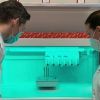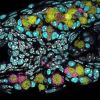-
 +40 +1
+40 +1Womb transplants are now a life-changing reality. Here’s how the extraordinary procedure works
The procedure may help the 1 in 500 women worldwide who have an infertility condition to conceive.
-
 +25 +1
+25 +1Hope for infertile men as scientists 3D print living testicular cells
Scientists in Canada have 3D-printed viable human testicular cells that they hope will eventually yield sperm from patients with forms of infertility that currently cannot be treated. The team at the University of British Columbia in Vancouver has been using a 3D bioprinter to create life-size models of human seminiferous tubules – the structures inside the testicles that normally produce sperm.
-
 +3 +1
+3 +1'Jaw-dropping' world fertility rate crash expected
The world is ill-prepared for the global crash in children being born which is set to have a "jaw-dropping" impact on societies, say researchers. Falling fertility rates mean nearly every country could have shrinking populations by the end of the century. And 23 nations - including Spain and Japan - are expected to see their populations halve by 2100. Countries will also age dramatically, with as many people turning 80 as there are being born.
-
 +13 +1
+13 +1Scientists Create Immature Human Eggs From Stem Cells
Scientists say they have taken a potentially important — and possibly controversial — step toward creating human eggs in a lab dish. A team of Japanese scientists turned human blood cells into stem cells, which they then transformed into very immature human eggs. The eggs are far too immature to be fertilized or make a baby. And much more research would be needed to create eggs that could be useful — and safe — for human reproduction.
-
 +27 +1
+27 +1Chemicals used in furniture and gym mats could be making women infertile, study suggests
Flame-retardant chemicals used on furniture and other products could be making women infertile, a new study suggests. Researchers in the US found more than 80 per cent of women having fertility treatment at the Massachusetts General Hospital had traces of three types of chemicals known as PFRs in their urine. And those with high levels of the chemicals were 38 per cent less likely to have a child after a cycle of IVF treatment than those with low levels. While the study does not prove the chemicals are causing infertility, it highlights a possible link.
-
 +5 +1
+5 +1The Art of Waiting
Yearning for conception. By Belle Boggs. (Mar. 2012)
-
Analysis+1 +1
PCOS: Treating adrenal androgen access
Polycystic Ovarian Syndrome treated naturoapthically
-
+1
Welcome!
Submit a link
Start a discussion




















